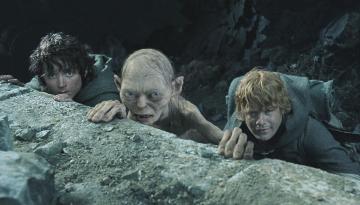Very briefly, for about 10 minutes after the first act, Manjummel Boys flirts tantalisingly with the idea of turning into a horror movie. Nothing in the previous 40-odd minutes had suggested that this might be a possibility. Nor had you heard anybody talk about this tonal transformation in the couple of months that it has taken for the Malayalam blockbuster — the industry’s biggest hit of all time — to arrive on streaming. But in that moment, at the first mention of a place called the Devil’s Kitchen, you lean in, because Manjummel Boys is offering you something that is becoming increasingly rare in modern Indian cinema — absolute unpredictability.
A bunch of young men from Kerala, on holiday in the Gunaa Caves of Kodaikanal, find themselves in a life-and-death situation when one of their buddies — Subhash, whose atheism is a key plot point — falls hundreds of feet into a pit wide enough for just one person to squeeze into. It’s raining, the cops are of no help, and chances of survival are next to nil. But the group doesn’t give up, forming a human fortress of sorts around the pit to stop the rainwater from flowing into it and drowning Subhash. They don’t even know if he’s alive, but they never lose faith. It’s a terrifying situation to be in, one that instantly recalls the famous Thai cave rescue operation from 2018, or the Chilean miners situation from 2010, or, as every Indian who lived through the TataSky era would remember, the Prince incident from 2006.

Also read – Kaathal – The Core: Jeo Baby must kill his inner crowd-pleaser; it’s the only thing separating his films from true greatness
But then, the relatively grounded reality of the narrative is momentarily broken by writer-director Chidambaram, when he gets the locals to start talking in hushed tones about the caves being some sort of supernatural gateway to hell. You don’t see it coming, but somewhere in Maine, Stephen King must’ve sneezed. While the Gunaa Caves got their name from a Kamal Haasan movie that was filmed there many years ago, the tourist destination was known during the British era as the Devil’s Kitchen, a mountainside maze that has claimed several lives over the years.
 A still from Manjummel Boys.
A still from Manjummel Boys.
While some members of the group keep vigil near the mouth of the cave, others scramble around looking for help. They end up at a nearby shop where they’d purchased some snacks a few hours earlier. The shopkeeper remembers them, but shivers at the mere mention of the pit. Refusing to help them, he declares that Subhash is as good as dead. It is only when his daughter scolds him for turning his back on people in need — guests from another city, no less — that the shopkeeper reluctantly agrees to follow them back to the spot, but not before grabbing a handful of lemons to ward off evil spirits. And this when the movie dangles the carrot of horror in front of our eyes. But the fact that Manjummel Boys doesn’t follow through with this thought, as fun as it would’ve been, is a sign of the storytelling discipline that has set the Malayalam film industry apart from the rest of the country in recent years.
Read more – Aattam: A masterclass in misdirection, Anand Ekarshi’s anti-whodunnit is an early contender for the movie of the year
Like the very effective Fahadh Faasil-starrer Malayankunju from a couple of years ago — a movie that the actor himself has expressed an unwarranted dissatisfaction with — Manjummel Boys doesn’t allow itself to be diluted by anything that doesn’t serve the story. Even the flashbacks are economical, wordlessly communicating more about character dynamics than what reams of dialogue in a lesser movie would have. We don’t cut away to their families, nor do we waste time on choreographed dance sequences or comic relief characters — the bane of mainstream Indian movies. Instead, director Chidambaram does what any good filmmaker presented with an ensemble story like this should: he makes sure to give each of the ‘boys’ recognisable traits, while meticulously explaining the geography of the location, well enough to the point that if you were to visit the Gunaa Caves tomorrow, you’d probably be able to make it to the pit yourself. Please don’t.
Manjummel Boys is effectively a movie about faith; it’s a movie that acknowledges the concept of heaven, hell and purgatory, but without ever using organised religion as a crutch to explain what happened that day. Nor do we ever see any character — and there are so many of them — pray for the safety of their missing friend at any point in the film. There are no cutaways to a church, a temple, or a mosque during the rescue operation, although Chidambaram was well within his rights to take this path, and probably get away with it with a pat on his back. For instance, even Ron Howard couldn’t resist inserting Buddhist monks in his excellent Thai cave rescue movie, Thirteen Lives.
 A still from Manjummel Boys.
A still from Manjummel Boys.
Read more – Bramayugam: Mammootty’s miraculous run continues with the bleakest Indian horror film in years, a take-no-prisoners tirade against humanity
The Manjummel Boys, however, are a secular, all-inclusive bunch. This is a story about brotherhood, after all; about human beings — strangers and lifelong friends alike — coming to the aid of one of their own. They cannot wait around helplessly for God to perform a miracle; they get their own hands dirty, sometimes literally. The movie doesn’t want to undermine their bond by suggesting that there was divine intervention in the rescue operation. There wasn’t; it was all down to the sheer bravery of these mere mortals. If anything, Manjummel Boys goes out of its way to underplay the role of religion. On the sole occasion that a church and priest are invoked — this happens right at the end — the movie uses them as yet another a tool to sprinkle hallelujahs on the human achievements, instead of grasping at straws to praise the Lord.
And when Manjummel Boys dabbles in a bit of horror, it doesn’t exactly rely on well-established religious imagery. In Malayankunju, the subterranean jail in which the protagonist was stuck after a landslide resembled a womb, symbolising his rebirth. In Manjummel Boys, Subhash’s purgatorial prison is more abstract, lit stylistically by cinematographer Shyju Khalid. After he is pulled out, locals gather around Subhash and, in a scene that takes on the otherworldly aura of a pagan ritual, declare him to be a god. Could there be a more explicit metaphor for what this movie is trying to say?
Post Credits Scene is a column in which we dissect new releases every week, with particular focus on context, craft, and characters. Because there’s always something to fixate about once the dust has settled.
Post Credits Scene is a column in which we dissect new releases every week, with particular focus on context, craft, and characters. Because there’s always something to fixate about once the dust has settled.
Disclaimer: The copyright of this article belongs to the original author. Reposting this article is solely for the purpose of information dissemination and does not constitute any investment advice. If there is any infringement, please contact us immediately. We will make corrections or deletions as necessary. Thank you.







